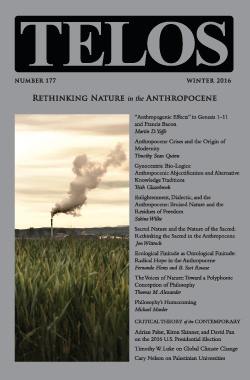By Cary Nelson · Monday, January 2, 2017 On the way back from Jerusalem to Ben Gurion airport following a few weeks in Israel in 2016 I settled in expecting to doze off. As usual it was 1 a.m., and I was pretty well done in from nonstop travel. But every taxi cab driver, Jewish or Arab, wants to talk, and I always learn something from these nonacademic conversations. Before long I was hearing things I was not eager to know, but it brought home the human costs of nearly a century of conflict.
Continue reading →
By Telos Press · Monday, December 26, 2016 Telos Press is delighted to announce that Elliot Neaman’s Free Radicals: Agitators, Hippies, Urban Guerrillas, and Germany’s Youth Revolt of the 1960s and 1970s has won first place in the History category at the London Book Festival. Congratulations!
Continue reading →
By Russell A. Berman · Wednesday, December 21, 2016 In addition to its main focus on nature and the Anthropocene, Telos 177 (Winter 2016) features a special section of topical writing, introduced here by Russell A. Berman, that continues our ongoing commitment to setting forth a critical theory of the contemporary. Telos 177 is now available for purchase in our store.
 After a rancorous and ugly presidential campaign, in which vitriol and name-calling replaced discussion and policy, one moment stands out for its dignity: President Obama’s grace and generosity when he welcomed the president-elect to the White House. Above the fray and with a Lincolnian refusal of malice, he modeled a possibility of reconciliation and healing, as if citizens might genuinely respect each other, despite profound differences. That utopia will likely remain elusive, but the president’s bearing provides a lesson in civic virtue. Democracy can be coarse. He showed how it can be better. That legacy will be important. After a rancorous and ugly presidential campaign, in which vitriol and name-calling replaced discussion and policy, one moment stands out for its dignity: President Obama’s grace and generosity when he welcomed the president-elect to the White House. Above the fray and with a Lincolnian refusal of malice, he modeled a possibility of reconciliation and healing, as if citizens might genuinely respect each other, despite profound differences. That utopia will likely remain elusive, but the president’s bearing provides a lesson in civic virtue. Democracy can be coarse. He showed how it can be better. That legacy will be important.
Continue reading →
By Jon Wittrock and Richard Polt · Monday, December 12, 2016 Telos 177 (Winter 2016) is now available for purchase in our store.
 While the term Anthropocene was used in the USSR already in the 1960s to refer to the late Quaternary era, it rose to prominence more recently when introduced by Eugene F. Stoermer and Paul J. Crutzen. As the very word indicates, this is an epoch when humanity has taken center stage in the sense that its activities now have a major, global, and lethal impact. The shadow of human-caused global destruction and mass death haunts this epoch, and indeed, humanity’s newly acquired capacity for devastation is one of the Anthropocene’s most marked traits. While mass extinctions are hardly new phenomena and while the specter of the extinction of humanity due to some sudden catastrophe was there even before human beings were aware of it in scientific terms, the actual capacity of humanity to extinguish itself along with a large swath of other species on the planet is new, and the stakes of human action are higher. While the term Anthropocene was used in the USSR already in the 1960s to refer to the late Quaternary era, it rose to prominence more recently when introduced by Eugene F. Stoermer and Paul J. Crutzen. As the very word indicates, this is an epoch when humanity has taken center stage in the sense that its activities now have a major, global, and lethal impact. The shadow of human-caused global destruction and mass death haunts this epoch, and indeed, humanity’s newly acquired capacity for devastation is one of the Anthropocene’s most marked traits. While mass extinctions are hardly new phenomena and while the specter of the extinction of humanity due to some sudden catastrophe was there even before human beings were aware of it in scientific terms, the actual capacity of humanity to extinguish itself along with a large swath of other species on the planet is new, and the stakes of human action are higher.
Continue reading →
By Telos Press · Friday, November 18, 2016 “The populace consists of individuals and free men, while the state is made up of numbers. When the state dominates, killing becomes abstract. Servitude began with the shepherds; in the river valleys it attained perfection with canals and dikes. Its model was the slavery in mines and mills. Since then, the ruses for concealing chains have been refined.”
—Ernst Jünger, Eumeswil
Continue reading →
By Fred Siegel · Tuesday, November 15, 2016 The public opinion pollsters have failed four times in the last 18 months. They thought that Netanyahu would be defeated in the contest for Israel’s prime ministership. They did not foresee the defeat of the peace referendum in Colombia. They were sure that Brexit would be defeated in Great Britain, and they were equally sure (with the exception of a few outliers like the LA Times longitudinal poll) that Hillary would be our 45th president. In all four cases the surveys reflected the pollsters’ attitudes but not the public’s. Like the New York Times, which has been eating crow over its election coverage, the pollsters need to get out in to the countryside more. The same holds true for the Hillary operatives who were caught by surprise. As a DNC source explained “it was all about analytics with them. . . . They were too reliant on analytics and not enough on instinct and human intel from the ground.”
Continue reading →
|
|



